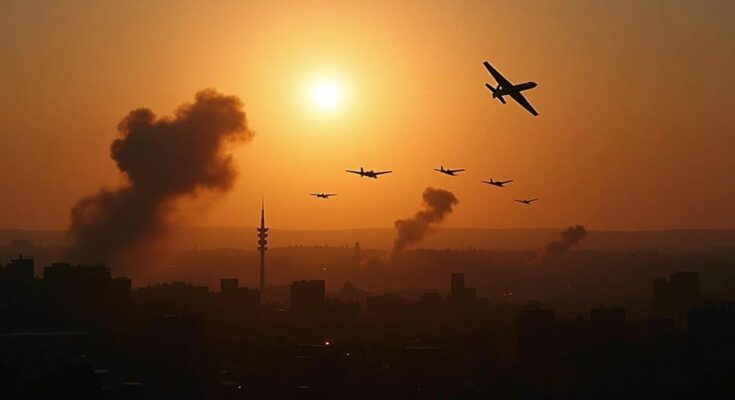Israeli military strikes have devastated residential areas in Beirut and led to at least 18 fatalities in the West Bank’s Tulkarem camp. Targeting alleged Hamas leader Zahi Yaser Abd al-Razeq Oufi and Hezbollah figure Hashem Safieddine, these strikes mark a severe escalation in conflict. International reactions emphasize concerns over humanitarian law violations amid rising tensions.
Israeli forces have launched what are reported to be the largest strikes to date on the southern suburbs of Beirut, leading to substantial destruction of residential buildings. In parallel, an air strike on the Tulkarem refugee camp in the West Bank resulted in the deaths of at least 18 Palestinians, marking one of the most lethal airstrikes in this region in over twenty years. According to Axios, the Israeli military targeted Hashem Safieddine, a key figure in Hezbollah and relative of the slain leader Hassan Nasrallah, during an air raid intended to eliminate him. Though reports indicate that Safieddine was sheltering in an underground bunker at the time of the strike, it remains uncertain whether he sustained any injuries or fatalities from the assault. Additionally, the Israeli forces confirmed the elimination of Zahi Yaser Abd al-Razeq Oufi, an alleged Hamas leader, amid the deadly Tulkarem airstrike. The Palestinian Liberation Organisation spokesperson, Rawhi Fattouh, condemned these strikes, asserting that such actions only serve to perpetuate further violence rather than establish peace and security in the region. He denounced the attacks as acts of “bloody, criminal aggression,” classifying the killings of civilians as war crimes that grossly violate international and humanitarian law.
The ongoing conflict in the Middle East has seen a sharp escalation in violence recently, primarily due to the Israeli military’s intensified operations against various groups, including Hezbollah and Hamas. The targeting of high-profile individuals linked to these organizations has become a significant aspect of Israeli military strategy. The situation is exacerbated by the multi-faceted geopolitical tensions in the region, particularly with Iran’s involvement, further complicating efforts for stability and peace. This backdrop is critical to understand the humanitarian impact and the geopolitical ramifications of such military actions.
The recent escalation of Israeli airstrikes within Lebanon and the Palestinian territories highlights an alarming trend of increased violence. The strikes have resulted in civilian casualties and have drawn condemnation from Palestinian leaders who view these acts as a flagrant violation of international law. As tensions remain high, the potential for further conflict appears imminent. This situation underscores the need for urgent dialogue and peace efforts to de-escalate the ongoing violence in the region.
Original Source: www.aljazeera.com




